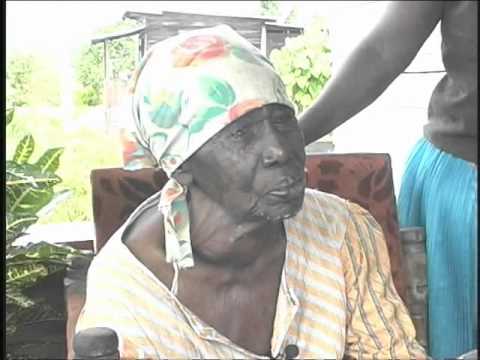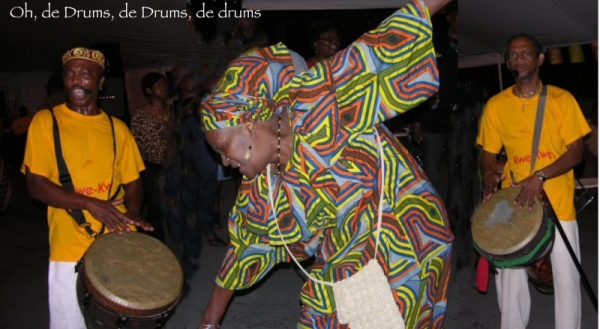Traditionally kwe-kwe in Guyana was celebrated in country areas such as Buxton, Golden Grove, Berbice and Essequibo. It is a pre-marital celebration that takes place the night before the wedding and is a ceremony performed by African- Guyanese.
Traditionally kwe-kwe began with a Ganda. Ganda is a Proto-Bantu word that has the meaning of a family social group or outside gathering. During this stage, rum is sprinkled on the ground, around the doors and windows to celebrate the memory of the ancestors, in reverence to God and the divinities, for purification, and to invite the presence of those seen and unseen.
After the libation ceremony, the people made their way to those they wanted to invite to the kwe-kwe. Then, pleasantries in the form of a greeting song: “Goo Night Ay” was exchanged. Afterwards the formal invitation was sung: “Come to my kwe-kwe,” inviting people to the celebration.
The singing and observances continued until midnight after which there was a shift in the ceremony. The procession then went in search of the groom-to-be. Amid more singing, the procession arrived at his mother’s house where the betrothed is seated as the mother remains standing. The singers then expounded the virtues of the groom-to-be while the mother is urged not to sell him because he is good and would be a loss to the community. When she decides to sell him, a gift is exchanged as the buying price and he is the first to be ‘bought’.
Thereafter, the chair on which the young man is seated was lifted into the air for all to see and then placed back on the ground. There follows more singing as the procession along with the prospective groom went in search of the bride- to-be. She could be a long way off and as the procession went in search of her, they used flambos; lamps with wicks, made from a bottle or tin and fuelled by kerosene. On the way, there is more singing: “Tell them children muddah to shut their chamber window, the little boy ah come again to carry their virgin daughter” etc.
Once the procession arrived at the gates of the girl’s house, they do not enter the yard, but begin singing another song: Nation, ah whey you nation? Nation ah whey dem deh? Nation me ah call ahwe nation, nation, ah whey dem deh? Nation cum tell me yuh nation. Nation ah whey dem deh? Nation, ah whey you nation? Nation ah whey dem deh? This song acknowledged that people had been taken from many different areas of West Africa and enslaved. It is a lamentation over the loss of cultural identity, cultural validation and belonging, loss of language, and family.
Once the betrothed was found, the process of selling was enacted again. However, this time after the bride price was given; the bride-to-be was covered from head to toe with a white sheet and lifted up on a chair for all to see.
While this was happening, the betrothed remained outside the gates. After that, the bride-to-be was carried to her betrothed and he also was placed on a chair and lifted up for all to see. While this was taking place, another song: Dis ah we Tadjah, hwe Tadjah. Hice ah we Tadjah, ah we Tadjah look ah we Tadjah. Dis ah we Tadjah, ah we Tadjah. This song was created sometime after 1838 when Muslims from Calcutta and Utter Pradesh started to arrive in Guyana as indentured labour and began to celebrate their festivals. This song asserted that kwe-kwe was a celebration of the African-Guyanese.
Later, the couple were instructed by way of more singing about the physical aspects of the marital relationship: “Woman lie down and the man can’t function, wu kinda man laika da, laika da? Take yuh calabash, wash yuh bembe Na me shame a yuh Muma shame” and a demonstration of the couples sexual skill: “Show me yu science” and responsibilities within the home. Meanwhile, the merriment continued finally ending with the departure song “Las wan, Las wan.”





